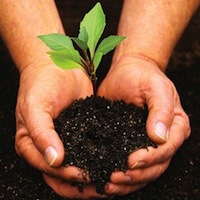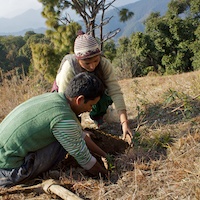 Plant Trees in India to Shrink Your Carbon Footprint & Employ Low-Income Villagers
Plant Trees in India to Shrink Your Carbon Footprint & Employ Low-Income Villagers
Earthville Orchards is a carbon offset and green jobs program enabling conscientious global citizens and responsible businesses to sponsor tree plantings in India to help reduce your net carbon footprint while providing eco-restorative employment for rural villagers.
Click the donate button to plant trees now by donating $3 per tree, or read on to learn more.
The Need for Carbon Offset
None of us wants to harm the environment, yet with our modern lifestyles we simply can’t help but produce more than our share of carbon emissions. All of us who use grid electricity, drive to work, or travel by plane are responsible (directly or indirectly) for more carbon emissions than our rapidly deforesting planet is able to handle. For example, the average resident of the USA is responsible for approximately 25 tons (50,000 pounds or 22,680 kilograms) of carbon emissions each year, and frequent fliers generate much more (e.g. a single round-trip flight between San Francisco and New York City produces the equivalent of about 2.5 tons of CO2 per passenger).
So how can we live sustainably in the modern world? When it comes to carbon emissions, the answer is to reduce our carbon footprint as much as we reasonably can through lifestyle adjustments and then offset the rest by planting trees. For example, we can shrink our carbon footprint by reducing our grid energy consumption at home and at work (such as by using more energy-efficient appliances, turning the lights off when we don’t need them, installing solar heating and electrical systems, etc.), and by taking public transportation or carpooling, and so on.
Such reduction measures will eliminate a part of our excess carbon emissions, but what about the rest? That’s where the concept of carbon offset comes in, and one of the most sensible carbon offset strategies is to plant trees. Lots of trees.
Why Trees?
A few of the main benefits of planting trees:
- An average tree, when mature, can sequester carbon dioxide at an average rate of 48 pounds (22kg) per year.
- An average tree can also return enough oxygen back into the atmosphere to support two human beings.
- The relatively low cost of tree planting makes it one of the most cost-effective carbon sequestration methods available.
- Tree planting combats deforestation and erosion.
- Tree planting promotes biodiversity.
Why India?
 There are six major benefits to planting trees in India:
There are six major benefits to planting trees in India:
- Due to industrial pollution, India has relatively high concentrations of airborne carbon, so trees can make a bigger difference.
- India’s temperate climate makes it an ideal candidate for carbon sequestration to have a positive impact on the environment.
- By employing rural villagers to plant and tend to the trees, we’ll be creating green jobs for rural women and others in need of income. We’re an asset to the local community rather than a negative force.
- The cost of planting trees in India is far lower than in most other industrialized countries, so we can plant more for the same dollar — more bark for the buck!
- Earthville already has established projects, partners, and volunteers in India, so we are able to oversee the project directly and ensure its success.
- Since many of the trees we’re planting are fruit trees, we’ll also be contributing organically grown fresh fruit to the local diet.
How Many Tree Plantings Should I Sponsor?
Individuals: An individual with an average modern carbon footprint of about 25 tons of CO2 per year will need to plant about 1040 trees to achieve a net-zero carbon footprint once the trees reach maturity (and, because the trees will take take to mature, and will sequester much less carbon while young, one may wish to plant additional trees to achieve a net-zero carbon footprint in a shorter time frame). Note that, for frequent fliers, the number will be higher (add about 60-100 trees per round-trip flight, depending on distance and class of travel).
Families: An average family of three will need to plant about 2500 trees to achieve a net-zero carbon footprint.
Businesses: As a general guideline, businesses tend to generate 3-4 tons of CO2 per employee (not counting travel), so an average business will need to plant about 150 trees per employee to offset office emissions, plus about 60-100 trees per round-trip flight (depending on distance and class of travel). Business that use servers or other significant IT should add about 80 trees per computer used.
What if my budget only allows for a smaller number? The most sustainable practice is to plant enough trees to achieve a net-zero or net-negative carbon footprint, but if budget constraints prevent you from planting enough trees to achieve a net-zero carbon footprint, you can still make a difference. Any reduction you make in your carbon footprint through tree plantings will be a real contribution to the health of our planet and the lives of the Indian villagers who are employed to plant the trees. The recommended minimum annual planting is 150 trees per person per year (at a cost of only $300 annually when sponsored through the Earthville Orchards). If you have the means to sponsor more than the recommended minimum plantings, please consider doing so. The more trees we plant, the more green jobs we can create while replacing atmospheric carbon with oxygen.
Your contributions are tax deductible in the USA and India to the extent allowed by law.
How It Works
The cost is only $3 (USD) per tree. Simply click the “donate” button below and enter the total amount you’d like to donate.
PS: If you’re on Facebook, follow the Earthville Orchards page.
The Earthville Orchards program was established in 2010 in partnership with the Dharmalaya Institute for Compassionate Living, a charitable organization based in India.
